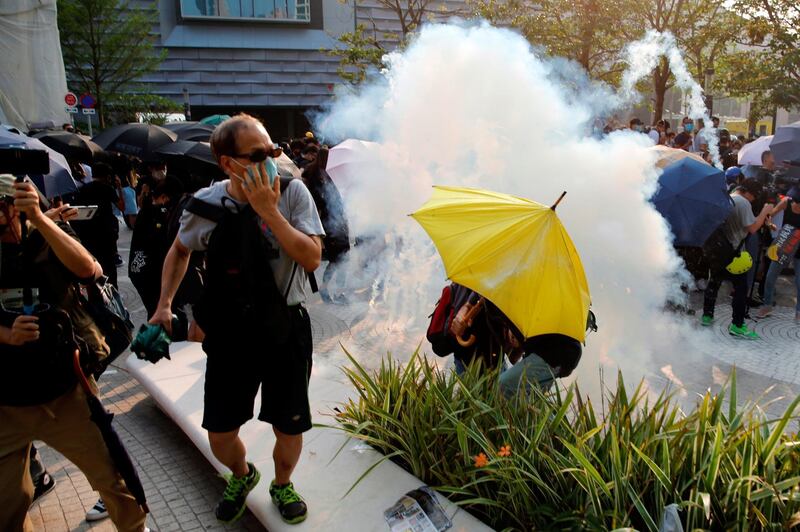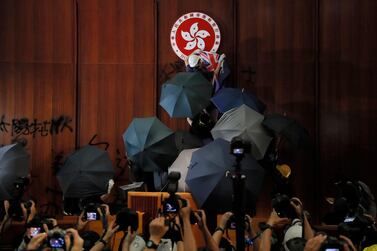Police fired tear gas and rubber bullets on Sunday at pro-democracy protesters who defied authorities to hold a rally on Hong Kong's scenic harbourfront, the latest flashpoint in months of political unrest gripping the city.
Clouds of acrid smoke wafted across streets usually packed with tourists, including outside the landmark colonial-era Peninsula Hotel, as protesters and police clashed in what has become a weekly ritual.
Many of the protesters wore masks, defying a recent emergency law banning face coverings. But few of those involved in the early clashes had protective helmets and respirators used by more hardcore frontliners.
Tensions built early on Sunday afternoon as riot police flooded the harbourside park in Tsim Sha Tsui district where the unsanctioned rally was due to take place.
Officers stopped and searched people, sparking confrontations as the crowds got bigger, many of them shouting "black cops" and "triads" at the police.
Tear gas, pepper spray and some rubber bullets were fired in at least three different locations as clashes broke out and crowds scattered.
Small groups of hardcore protesters then built barricades and blocked roads in a familiar game of cat and mouse with police.
Some used metal fencing from nearby luxury malls to block the "Avenue of Stars", a famous waterfront promenade.
Police said some of their officers were attacked with "hard objects and umbrellas".
Later in the evening police fired water cannon at protesters in Tsim Sha Tsui as they faced crowds yelling insults at them.
Hong Kong has been battered by nearly five months of large and frequently violent pro-democracy protests which Beijing and its local leaders have taken a hard line against.
With no political solution on the table, the city's police have been largely left to deal with the protesters, becoming increasingly loathed by the pro-democracy demonstrators.
Hardcore protesters have hurled petrol bombs and bricks, vandalised pro-Beijing businesses and assaulted people who disagree with them.
Prominent pro-democracy figures have also found themselves the targets of attacks by gangs of men, undermining the international finance hub's reputation for stability and safety.
In a blog published on Sunday, Financial Secretary Paul Chan warned that the city may post negative growth this year because of the protests.
"It seems that it is extremely difficult to achieve the forecast of zero to one per cent," he wrote.
In the last few days, protests have not been as large or violent as earlier this month when some of the most sustained clashes took place.
But smaller "flashmob" protests have been staged almost daily.
"It may look like less people are coming out but it's just that everyone is using different methods to support the movement," said a 23-year-old protester, who gave her surname Chan.
A teenaged protester, who declined to give his name, said many felt they had to keep going on to the streets because few of their demands had been met.
"Without genuine universal suffrage and democracy, this will happen again and we will have to fight again in the future," he said.
"I do worry about being arrested. But I have prepared my last words and have left them at home."
Among the demands from protesters are an independent inquiry into the police, an amnesty for the more than 2,500 arrested and fully free elections, of which have been refused by Beijing and Hong Kong Chief Executive Carrie Lam.
The one concession made so far has been to scrap a plan to allow extraditions to the mainland – an issue that sparked record-breaking protests earlier in the year before the movement morphed into a wider anti-government revolt.






